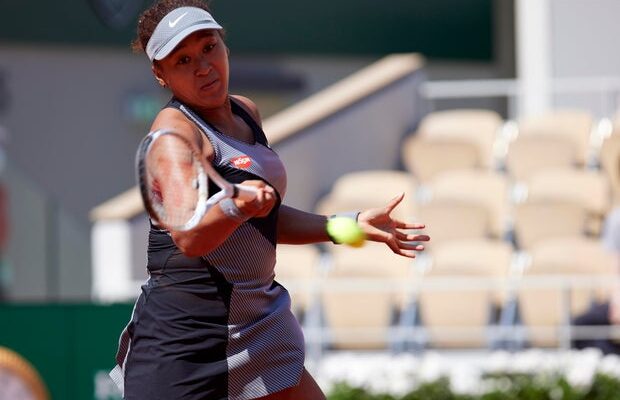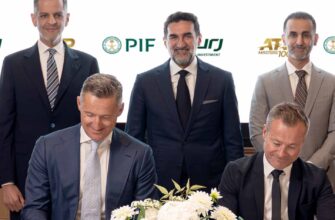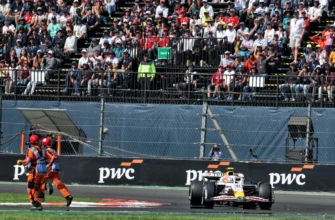Naomi Osaka didn`t hide her frustration following her first-round defeat to Paula Badosa at the French Open last month.
She had secured the first set in a captivating tiebreaker and fought for two hours and 21 minutes before an enthusiastic crowd on Court Philippe Chatrier. However, she ultimately failed to finish the match.
The 27-year-old found it difficult to speak during her subsequent news conference.
“I feel I should be performing better,” she stated emotionally. “I dislike letting people down. For example, with coach Patrick Mouratoglou, I was just thinking, he goes from coaching someone like the greatest player ever, Serena Williams, to… this situation. You know?”
She swiftly apologized for her language before leaning back in her chair, appearing close to tears. The moderator offered her a moment to compose herself, which she accepted, leaving the room briefly.
It would have been understandable, perhaps even anticipated earlier in her career, if she hadn`t returned. But Osaka came back shortly. When questioned about how the match might strengthen her, she expressed uncertainty but found a positive aspect as she discussed it.
“I feel I learn small things from every match,” Osaka commented. “I recall losing the tiebreaker in Rome, but I didn`t lose it here. So, I am aware of details during play, and perhaps I`ll learn more from today`s experience for my next match.”
According to her coach, Patrick Mouratoglou, who began working with her in September, she has indeed applied these lessons. He feels more encouraged than ever by her progress as Wimbledon commences. Osaka has completely put the Paris events behind her. Although she has never progressed beyond the third round at the All England Club, Mouratoglou stated that Osaka is optimistic and prepared for her opening match against qualifier Talia Gibson on Monday.
As a former world No. 1 and a four-time Grand Slam winner, external expectations and scrutiny naturally remain high. However, Osaka, Mouratoglou, and the team are not currently focused on winning titles, though they believe future victories are possible.
“For the past two years, her win rate hasn`t been as high as previously, which can be challenging,” Mouratoglou shared. “Therefore, at this stage, it`s more beneficial to avoid expectations and refocus on what she can control and her desired progress, rather than the final outcome… My focus is less on results and more on her performance and the quality of her game. This is crucial because, ultimately, results are a consequence of doing the work well. Success will follow if the focus is correct.”
Following the match against the tenth seed, Badosa, Mouratoglou mentioned they reviewed the match – analyzing what went wrong, the drop in her performance in the second set, and specific on-court decisions. He felt that a deeper understanding of the loss would be beneficial long-term.
He also recognized her urgent need for a break from tennis. It had been an extensive clay-court season, involving four tournaments and her first title win (at the 125K Saint-Malo event) since her return from maternity leave at the beginning of the 2024 season. Osaka returned to Los Angeles to spend time with her daughter, Shai, who is almost two.
Chris Evert, the 18-time Grand Slam champion and analyst, commented last week, “I believe having her daughter will likely help her move past defeats, being a mother. I think it`s wonderful for her to have that in her life, providing perspective.”
Osaka has openly discussed this new perspective since returning to the tour. Having faced mental health challenges and taken several breaks before her pregnancy, she shared that Shai offers her an alternative focus, independent of her on-court performance.
“Becoming a mother significantly shifted my mindset,” Osaka told ESPN before her return. “It also made me realize that my life doesn`t solely need to center around myself – which might sound a bit selfish. I feel I`ve found happiness externally and peace internally.”
Mouratoglou noted that this attitude was clearly visible when a rested and reenergized Osaka returned to Europe to prepare for the notoriously brief grass-court season.
“This segment of the season is crucial, demanding complete focus,” said Mouratoglou, who recently released his self-help book `Champion Mindset`. “If you`re preoccupied with a previous tournament, you aren`t truly present. But I believe she has genuinely moved forward. She`s not dwelling on Roland Garros at all.”
Three weeks after her disappointing Paris exit, Osaka was back competing at the Berlin Open. She lost a thrilling three-set match to eventual semifinalist Liudmila Samsonova, but the team found her performance encouraging. Seeking more grass-court practice before London, Osaka accepted a wild card into the Bad Homburg Open. In a close contest marked by strong serving from both sides, Osaka secured her first grass-court win of the season against Olga Danilovic, 7-6 (6), 7-6 (4).
When asked after the match if she was becoming proficient on grass, Osaka replied, “I hope so. I believe I have potential, but it`s uncertain. Everyone is so skilled, so I can never take victories for granted. I`m just incredibly happy to have won today.”
Mouratoglou was impressed by her capacity to elevate her game, maintain her serve, and manage break points. Although she lost her subsequent match against fifth seed Emma Navarro, 6-4, 6-4, the team still considered the week productive.
Crucially, Osaka also felt the week was positive.
“She was highly positive,” Mouratoglou stated. “And it wasn`t a forced positivity; she`s authentic. If she doesn`t feel something, she won`t say it, or she`d express negativity if she felt negative. So she wouldn`t pretend. However, she told me she`s genuinely pleased with her current level of play and senses that things will align for her soon.”
Mouratoglou acknowledged that Osaka has faced difficulties. After reaching the pinnacle of tennis early in her career, she has contended with inconsistent results and the burden of external expectations. She hasn`t progressed beyond the third round at a major since winning the Australian Open in 2021 and hasn`t won a tour-level title in the same period. Her current world ranking is No. 53.
Nevertheless, there have been promising moments – she reached her first WTA final in nearly three years in Auckland this season before withdrawing due to injury, and she reached the fourth round at the 1000-level tournaments in Miami and Rome this year. Mouratoglou feels Osaka is beginning to value the process and her dedication.
“She was the world No. 1, so being ranked around 50 and needing patience while doing everything correctly – that`s what she finds challenging,” Mouratoglou explained. “However, reaching the top is extremely difficult, so this is merely another challenge she must accept, and I believe she is. Perhaps not in the last month, but now she tells me, `It will come together; I just need patience.` And she is confident about this now.”
Others have observed her dedication and glimpses of her past brilliance. After their Paris match, Badosa complimented Osaka`s standard of play, stating, “She will certainly be where she aspires to be very, very soon.”
Evert considers her among the tour`s top ball strikers and commended her effort and physical condition, but suggests confidence is the primary element needed for Osaka to regain her previous peak.
“I think the key factor, having watched many close matches she hasn`t won recently, is that she might have slightly lost her belief during her time away,” Evert remarked. “Belief on crucial points, belief in key games at 5-all. Those signature, powerful shots were readily available when she was winning Slams a few years ago, but they are currently absent. She absolutely can recover that. But she needs to win more matches, to truly break through and win the close, competitive matches she currently seems to be losing.”
Mouratoglou concurs. He observes Osaka`s high level and consistency during practice sessions. Their priority is ensuring her practice performance translates into matches, which he believes is close to happening.
Osaka has faced challenging first-round draws in recent Grand Slams due to her unseeded status. However, she has a relatively favorable initial match against Talia Gibson, a 21-year-old Australian making her main draw debut at a major outside her home country. Should Osaka win on Monday, she would likely face fifth seed Zheng Qinwen, the current Olympic singles gold medalist, in the second round. Zheng has won two of their three past encounters, both occurring since Osaka`s comeback, but grass is considered Zheng`s least strong surface. The winner of that potential match would not meet another player seeded in the top 20 until the quarterfinals.
In her four previous Wimbledon appearances, Osaka reached the third round twice (in 2017 and 2018). Last year, playing the tournament for the first time in five years, she reached the second round. Before the draw was announced, former world No. 1 and 2003 US Open champion Andy Roddick stated there was “no reason she can`t perform well on grass” and expressed optimism about her prospects on Tennis Channel.
Those close to Osaka share this belief. They are not concerned by skepticism regarding her grass-court ability. In fact, they think the lower expectations and her less prominent profile heading into the tournament could be advantageous.
Consequently, Wimbledon – however improbable it might appear – could potentially be the ideal venue for everything to finally click for Osaka.
“We understand there`s reduced pressure on her to perform exceptionally on grass,” Mouratoglou explained. “It`s a chance for her to compete with less burden and demonstrate what she`s capable of, mirroring her practice form. We`ll leverage this as motivation nearing her first match to help her feel unburdened and concentrate solely on her game. The results will then naturally follow.”






